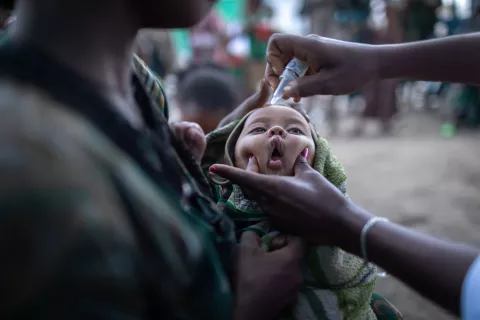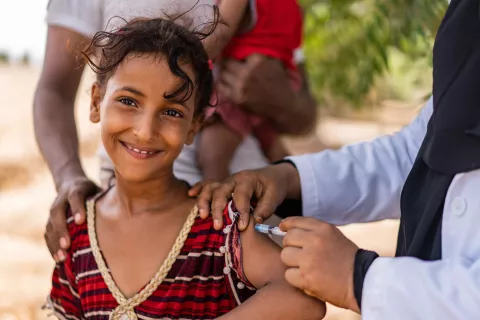Mind the gap for migrant children
Mind the gap for migrant children

- Available in:
- 中文
- English
Beijing, March 2010 – Over the past 17 years, Li Qiang, a staffer with the Migration Administration Office of Beijing's Jiugong Town, has witnessed the geographic marginalization of the city's migrant workers, as they have been pushed further out into the periphery of the city.
"At first, the migrant workers lived out by the third ring road, five kilometres away from Beijing's city centre. Now, they mostly live out by the fifth ring road, 10 kilometres from the city centre. As the city's housing construction continues to expand, their next stop is the sixth ring road, nearly 20 kilometres from the centre,” Li Qiang said, as he pointed to bulldozers razing bungalows near a ditch filled with garbage.
In 2009, more than 8,000 migrants lived in a labyrinth of bungalows they rented from local villagers. They worked as vegetable vendors, garment workers, garbage collectors, construction material sellers and in other small businesses with an average monthly income of around 2,000 yuan (about £195).
Li Qiang and health workers from Jiugong Town Hospital recently visited a small garment workshop, where they identified a 3-year-old girl without a vaccination card.
"We came here about one month ago from another district of Beijing to work in this garment workshop. I have no idea whether my child has received all the necessary vaccinations. I just don't know how to register her for the vaccinations,” the father, in his early 20s, told the health staff. The health staff explained the importance of young children receiving scheduled vaccinations and asked the couple to take their daughter to the town hospital, where they could register her to receive free vaccinations.
According to Mr. Xu, the director of a township healthcare service station in Beijing's Chaoyang District, more than half of the city's migrant workers move to other parts of the city within a year.
"There are cases in which the day after migrant children are registered to receive immunization services at our station, they move away because their parents have found a new job in some other area,” he said.
Due to population mobility and low awareness, the immunization coverage of migrant children in Beijing is lower than that of local children by about 10-20%, and measles incidence amongst migrant children is 10 times higher than among local children.
UNICEF and the Beijing Centre for Disease Control and Prevention are working to ensure that children of migrant workers enjoy equal access to immunization services.
"Whenever there are newcomers in this area, their landlords will ask them to register with us. In the case of migrant families with children, we share the children's information with the local hospital so that they can be registered to receive free vaccinations,” Li Qiang said.
During a recent visit to an inoculation room in Jiugong Town Hospital, four primary-school-aged children received missed vaccination doses. "One was a migrant child who had just transferred from a school in the northern suburban area," a nurse said.
The UNICEF-supported Child Immunization Registry and Information System was recently introduced in Beijing's migrant communities. With the new immunization registry information system, local health workers are now able to trace the inoculation history of more than 50,000 children in three project districts. “This system allows us to follow children as they move into and out of towns, and also records what doses they've received so far,” a staff said.
Eight-month-old Wang Zihan has had an immunization history card since her birth. “After each visit, the doctor will tell us when to bring her in for the next inoculation,” the mother, Sun Fulan, said. “They also send health education staff and distribute flyers in our community to share the message of how important vaccination is for our children.”
"I hope my child grows up healthy and can one day become a permanent Beijing resident so she doesn't have to do manual labour like me,” Sun said.



